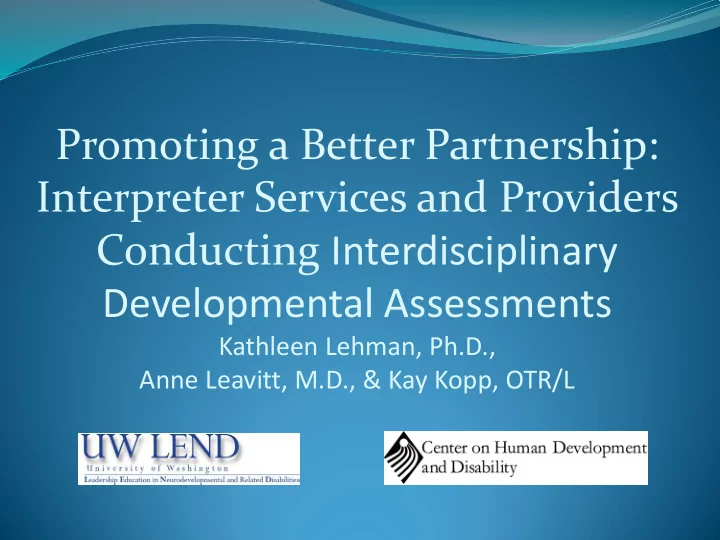

Promoting a Better Partnership: Interpreter Services and Providers Conducting Interdisciplinary Developmental Assessments Kathleen Lehman, Ph.D., Anne Leavitt, M.D., & Kay Kopp, OTR/L
Learning Objectives Understand need for different interpreting 1. techniques for pediatric developmental assessments Describe the partnership between providers and 2. medical interpreters Review the curriculum content for training medical 3. interpreters working with children in interdisciplinary developmental assessments
UW LEND at Center on Human Development and Disability (CHDD) What we do: Serve patients and families across the life span Provide interdisciplinary assessment, diagnosis, recommendations Evaluate children ages birth-18 years in the pediatric clinics Train students, professionals, and community members
Pediatric Clinics at CHDD Child Development Clinic Infant Development Follow-up Clinic Fetal Alcohol Spectrum Disorder Clinic Congenital Hypothyroidism Follow-up Clinic Cardiac Neurodevelopmental Clinic Down Syndrome Specialty Clinic Biochemical Genetics Clinic PKU Clinic www.chdd.washington.edu
Need for Training Increasing population of linguistically diverse • families require assessment of neurodevelopmental disorders Title VI of the Civil Rights Act mandates • interpreter services for all patients with limited English proficiency https://www.hhs.gov/sites/default/files/ocr/civil rights/resources/factsheets/yourrightsundertitle viofthecivilrightsact.pdf
Need for Training (Cont’d) Adapt interpretation methods from parent-focused to • child-focused during standardized assessments Educate interpreters in understanding child behavior • challenges and in how to follow clinician’s lead We experienced some challenges with interpreters during • developmental assessments: Not interpreting for children, especially if parent spoke • English Not interpreting exact words of the provider • Adding additional directions, gestures, or prompts that • spoiled that standardization of the testing Attempting to manage a child’s behavior by giving • directives
Action UW LEND at CHDD in collaboration with UW Medical Center Interpreter Services developed a specialized training for interpreters working with providers during developmental assessments. In-person training with 57 interpreters completed in February 2017 Posted on our UW LEND website: http://depts.washington.edu/lend/links/index.h tml Videos of in-person training part 1 and 2 Course handbook from training
Comparing Roles of Interpreters Adult Medical Child Medical Developmental Encounter Encounter Evaluation of the Child Patient presents Parent/caregiver presents Parent/caregiver presents complaint/concern about concern about their child’s concern about their child’s own health health/development health/development Patient communicates Much of communication is In testing situation, much of directly with provider via parent, but child may clinician’s communication is also respond directly with child, though some parent interview and/or observation will occur Patient comes by self or may Child is brought by parent Depending on age of child, bring family member who typically remains in parent may be in observation room room or lobby Patient gives consent for care Parent gives consent for Parent gives consent for care care. In WA State, teens In WA State, teens > 13 years > 13 years must give own must give own consent for consent for care care
Types of Tests Used in Developmental Assessments Interview Observation Questionnaires Standardized tests Non-standardized tests
Training on the Role of Interpreter: Pediatric Medical Appointment vs. Developmental Assessment Useful in multiple settings : -- Schools -- Autism Centers -- Birth-to-3 Centers -- Medical Centers -- Children’s Hospitals -- Outpatient Clinics
Keys to Effective Partnership Between Interpreters and Providers in Developmental Assessments Brief information sharing prior to each assessment Interpreter follows provider’s lead Both partners ask clarifying questions Both partners understand their role
Effective Interpreters Have self-awareness of own attitudes toward individuals with disabilities Are calm and have patience Show kindness and friendliness toward parents and children of all ages Have flexibility (to accommodate to changes in schedule and child’s needs; to physically move around with child )
Interpreter Knowledge and Skill Base Knows medical terminology related to physical, mental, and social development Knows how to access resources about typical child development and common neurodevelopmental disorders Ability to accept guidance from multiple providers during evaluation process Shows alertness to possible cultural misunderstandings and the need to cue provider accordingly
Learning Objectives Used in the Interpreter Training Define pediatric developmental assessment and • understand related terminology Provide information about different • interpretation techniques for pediatric developmental assessments Explain how to partner with providers of different • disciplines during pediatric developmental assessments
Interpreter Training Content Described our clinics and services Provided videos of assessments with different disciplines using interpretation Provided education on typical development and diagnoses Created course handbook for interpreters to use as a reference on development and diagnoses Described partnership between interpreters and providers
Medical Interpreting During Interdisciplinary Developmental Assessments of Children Course Handbook Developed by: Amy Carlsen, RN Anne Leavitt, MD Sharon Feucht, MA, RD, CD Kathleen Lehman, PhD Kay Kopp, OTR/L John Thorne, PhD, CCC-SLP February 2017 www.chdd.washington.edu
Table of Contents Course Learning Objectives……………………………………..……………………….…………….……………..i Power Point Slides………….………..…………………………………………………………………………………1-7 CHDD Child Development Clinic Description……………………………….……………………………….8 Typical Developmental Milestones (Table 1)…………………………………………………………..9-10 Common Neurodevelopmental Conditions in Childhood (Table 2)………………………….11-12 Comparison of Clinician/Patient Interactions (Table 3)………………………………………..………13 Guidelines for Working with Pediatric Patients……………………………………………….………14-15 Discipline Descriptions and Interpreter Expectations for Evaluation • Audiology…………………………………………………………………………………….……………………..….16 • Speech Language Pathology……………………………………………………………………………………17 • Psychology……………………………………………………………………..………………………………………18 • Medical Assistant…………………………….………………………………………………………………...….19 • Developmental Pediatrics………….………….…………………………………………………………..…..20 • Nurse Practitioner………………………….………….…………………………………………..………..…….21 • Occupational Therapy and Physical Therapy…….….……………………………………….……....22 • Nutrition…………………………………………………………………….…….………………………………….…23 • Social Work………………………………………………………………….…………………………………….....24 Glossary of Terms…………………………………………………………………………………………………….25-31
Recommend
More recommend